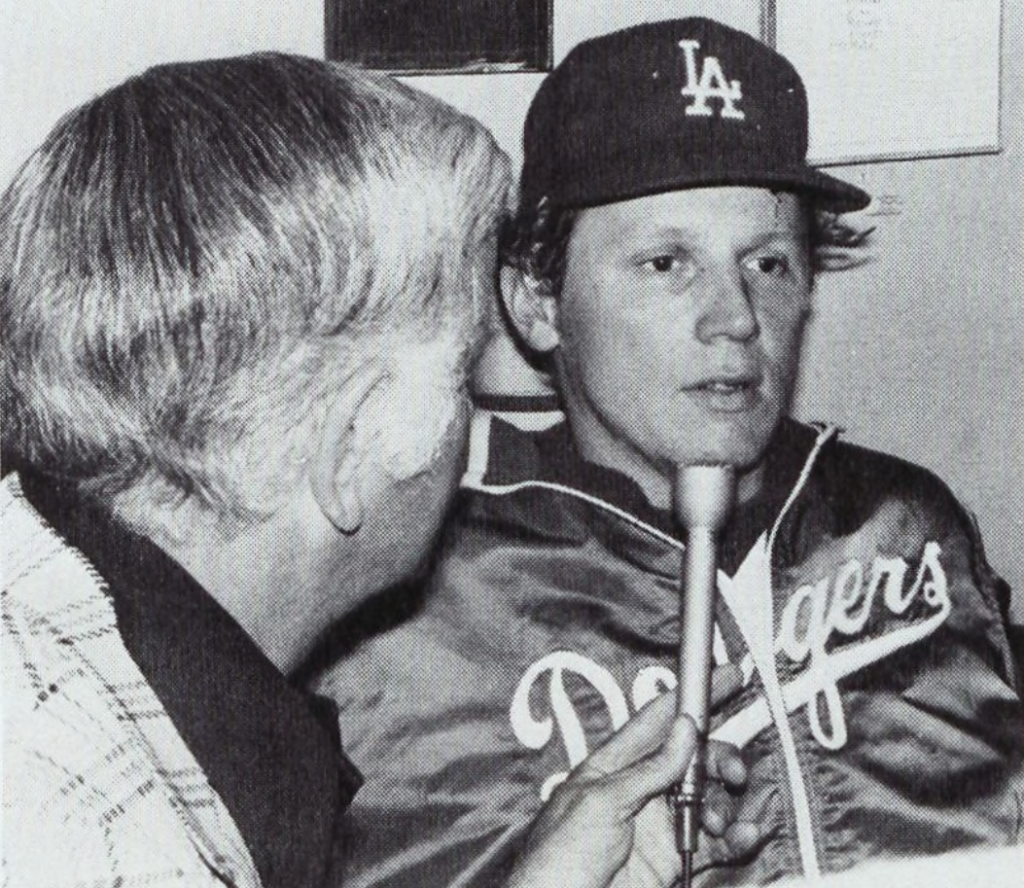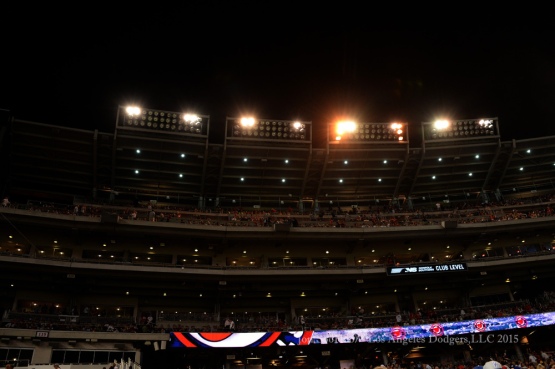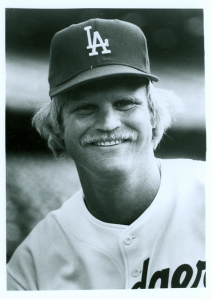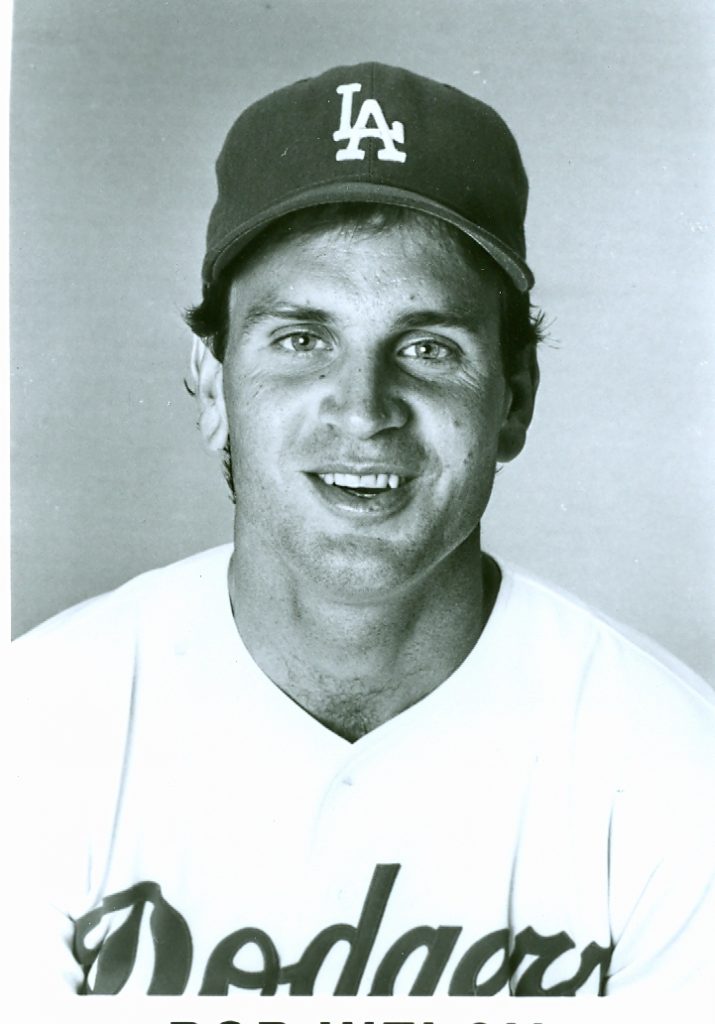With Part Four of Brothers in Arms: Koufax, Kershaw, and the Dodgers’ Extraordinary Pitching Tradition (pre-order now!), we head directly into the pitchers of my own childhood, the ones I can describe to you first-hand. This section of the book is titled “The Modern Classicists,” underscoring that while we were a long way from the black-and-white era of the Boys of Summer, there will always be something pristine and Old School about the pitchers who carried the Dodgers from the 1970s into the ’80s.
Tag: Bob Welch
10/12/88: *Dodgers 6, Mets 0 (NLCS)
10/19/81: Dodgers 2, *Expos 1 (NLCS)
10/11/81: *Dodgers 4, Astros 0 (NLDS)
10/14/65: Dodgers 2, *Twins 0 (WS)
10/10/56: Yankees 9, *Dodgers 0 (WS)
10/4/55: *Dodgers 2, Yankees 0 (WS)
10/7/52: Yankees 4, *Dodgers 2 (WS)
10/6/47: *Yankees 5, Dodgers 2 (WS)
*home team
By Jon Weisman
The last time the Dodgers played in a winner-take-all playoff game, the winning pitcher was Orel Hershiser.
That was October 12, 1988, when Hershiser pitched the Dodgers to a 6-0 victory in Game 7 of the 1988 National League Championship Series (a series that receives some fine oral history treatment from Lyle Spencer of MLB.com).
For all the talk of home-field advantage in the postseason, the Dodgers have been in 12 playoff series since the last time one of them went down to the final game. Will this year be different? We’re certainly due.
The last time the Dodgers played the final game of a playoff series on the road was October 19, 1981, when Rick Monday homered in the ninth and Bob Welch got the final out for Fernando Valenzuela to win Game 5 of the 1981 NLCS.
In fact, the Dodgers haven’t lost a winner-take-all playoff game since Game 7 of the 1956 World Series, and haven’t lost one on the road since Game 7 of the 1952 World Series. The Dodgers are 5-3 overall in winner-take-all playoff games, triumphing in their past four, and have pitched shutouts in half of them.
In every issue of Dodger Insider magazine, we run a boxscore of the month, and the one for August happens to tie in with what’s happening in Washington right now.
Dodgers 2, Cubs 1
August 17-18, 1982It began innocuously enough one afternoon in Chicago. Ex-Dodger Bill Buckner drove in a run for the Cubs with a groundout in the bottom of the first. Dodger catcher Mike Scioscia tied the game in the top of the second with an RBI single. But no more runs would cross the plate that day, all the way into the top of the 18th, when darkness at the lightless Wrigley Field forced the game to be suspended until after the next sunrise.
When the teams reunited, the Dodgers’ scheduled starting pitcher for Tuesday, Jerry Reuss, took the mound in relief. By the time it was over, after the Dodgers pushed across a run in the top of the 21st inning on Dusty Baker’s sacrifice fly, pitchers Fernando Valenzuela and Bob Welch had both played outfield. Reuss got the win – and then another when he pitched five innings that afternoon in a 7-4 Dodger victory that was over in 2:21.
I bring this up because I can’t help imagining Clayton Kershaw repeating the Reuss ruse of getting all his innings out of the way at first by starting the day in relief.
[mlbvideo id=”31120059″ width=”550″ height=”308″ /]
Bob Welch was much more than a single strikeout of Reggie Jackson.
He pitched three one-hitters; I was at one of them, a 15-year-old trying to explain to the people he was with why the game was special. He pitched a shutout against the Reds in 1983 and homered off Mario Soto for the only run of the game. He had a 3.14 career ERA with the Dodgers, then moved on to Oakland and had a Cy Young Award-winning season when he won 27 games. After retiring, he became the pitching coach for the 2001 Arizona Diamondbacks, who won the World Series.
He was also someone who shared his personal life and battle with addiction in the book, “Five O’Clock Comes Early,” and as recently as this year, he was sharing difficult details of his life so that it might be of help to others.
It was hard not to be a fan of Welch, long after he faced down Jackson from 60 feet, six inches away.
Nevertheless, that strikeout looms so large in the legacy of Welch, who has passed away at the age of 57. Before Jose Lima, before Orel Hershiser, before Jerry Reuss, before anyone, it might be the singular postseason pitching moment in my lifetime of following the Dodgers.
Here’s my chapter on that event, from 100 Things Dodgers …
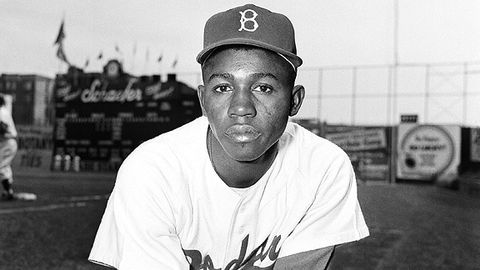
APJim Gilliam spent 25 years – half his life – in a Dodger uniform.
Keeping with this week’s theme …
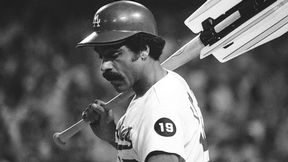
Game 1 of the 2010 World Series almost exactly matched the final score of Game 1 of the 1978 World Series. That was Dodgers 11, Yankees 5, and it was played the night the Dodgers, for the only time in their history, retired the number of a non-Hall of Famer.
Jim Gilliam had passed away two nights earlier, barely 24 hours after the Dodgers won the National League pennant.
From Ross Newhan of the Times:
Throughout the playoff victory over Philadelphia he was driven by the memory of his relationship with Jim Gilliam, saying he had never before reached such an emotional peak, that when he went to the plate he could hear Gilliam speaking to him.
Davey Lopes, the Los Angeles captain, again resembled a man possessed Tuesday night at Dodger Stadium as the Dodgers, dedicated to sustaining the memory, crushed the New York Yankees, 11-5, in the inartistic opening game of the 75th World Series.
Lopes, who batted .389 against the Phillies, hitting two home runs while driving in six runs, ripped a two-run homer in the second inning and a three-run homer in the fourth, propelling the Dodgers into a lead that was 7-0 before Tommy John permitted his first run. …
The flags in center field were at half-staff and the game began only after the crowd was asked to join in a moment of silent meditation. The Dodgers carried a memorium to Gilliam on the sleeve of their uniform, a black patch with Gilliam’s No. 19 embossed in white.
“We dedicated the pennant to Jim,” manager Tom Lasorda said, “and we are determined to dedicate a world championship to him.” …
“Jimmy is up there watching us,” Lopes said following Tuesday’s victory. “His spirit is in each of us. The Yankees beat 25 guys last year and this year they’ll have to beat 50 of us. We’re going to do our damndest to win this for him and we’re confident we will.”
Things only became more emotional the next day. “On the afternoon of October 11,” I wrote in “100 Things,” “with Game 2’s first pitch hours away, baseball paused and gathered at Trinity Baptist Church to pay their respects – 2,000 strong – at Gilliam’s funeral. A memorable photo from that day shows Dodger tormentor Reggie Jackson of the Yankees standing solemnly between Lopes and Tommy Lasorda. All three delivered eulogies.” That long day’s journey into night ended with Bob Welch’s legendary triumph over Reggie Jackson for the final out.
From “100 Things”:
Clinging to a 4-3 lead in the top of the ninth, the Dodgers sent out Terry Forster for his third inning of work. Yankee playoff hero Bucky Dent opened the inning with a single to left field and moved to second on a groundout. A walk to Paul Blair put the go-ahead run on base, signaling that Forster had passed his expiration date.
Lasorda’s do-or-die replacement had 24 career appearances, 11 in relief. The two batters he needed to get out, Thurman Munson and Jackson, had 465 career home runs – three of them hit by Jackson in the last game of the previous year’s World Series. Dodger fans at the stadium and across the country waited for the roof to cave in.
Welch fed a strike in against Munson, who hit a sinking drive to right field that Reggie Smith caught at his knees.
APSteve Yeager is triumphant as Reggie Jackson strikes out.It was Jackson time. This wasn’t just any slugger. This was the enemy personified, a man, though well-liked in his later years, considered perhaps the most egotistical, vilifiable ballplayer in the game.
Welch began by inducing Jackson to overswing and miss. With Drysdalesque flair, he then sent in a high, tight fastball that sent Jackson spinning into the dirt.
Jackson later told Earl Gustkey of the Times that he was expecting Welch to mix in some of his good offspeed pitches, but instead came three fastballs, each of which were fouled off. Then there was a waste fastball high and outside to even the count at 2-2.
After another foul ball, another high and outside fastball brought a full count. The runners would be moving. Short of another foul, this would be it.
As everyone inhaled, in came the heat. Amped up, Jackson swung for the fences – not the Dodger Stadium fences, but the fences all the way back in New York.
Only after Jackson missed the ball and nearly wrapped the bat around himself like a golf club, only through Jackson’s rage, could Dodger fans begin to comprehend what happened.
Jackson carried his fury into the dugout and clubhouse with him, pushing first a fan on his way to the dugout and then Yankee manager Bob Lemon once inside.
The only thing that could have made the event better for Dodger fans would have been for them to have had longer to enjoy it. The Dodgers didn’t win the World Series that year; they didn’t win another game. Welch himself was the losing pitcher in Game 4, allowing a two-out, 10th-inning run in his third inning of work, and gave up a homer to Jackson in Game 6. But for a moment, the Dodgers and their fans enjoyed one of the most triumphant and exhilarating victories over the Yankees ever imaginable.
There probably hasn’t been a more emotionally charged Los Angeles Dodger team in history. That includes 1988. This was a team that had revenge and redemption on its mind all year, feelings that were only intensified by the passing of their beloved coach.
And they fell in their next four games – a 5-1 Game 3 loss, the bitter 10-inning, Game 4 defeat that starred Jackson’s moving hip, and then the final two games by a combined 19-4.
Sometimes, the stars seem aligned; sometimes, you have every reason to believe. And sometimes you lose, even when you leave everything you have, absolutely everything, on the field.
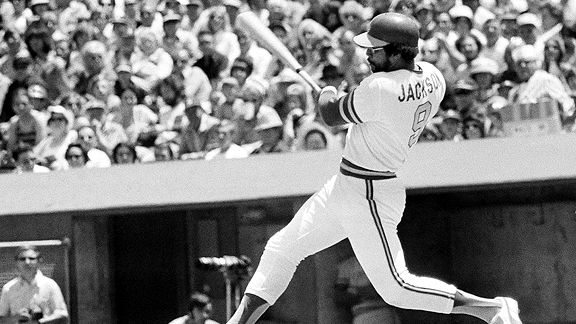
AP
Reggie Jackson played in five consecutive All-Star Games from 1971-75 and 14 in his career.
In 1973, Reggie Jackson won the American League Most Valuable Player Award. In 1974, he finished fourth in the voting (in a year he had a .391 on-base percentage, .514 slugging percentage and a league high 20 intentional walks and 166 adjusted OPS).
In 1975, two years before he would begin tormenting Los Angeles in consecutive World Series, Reggie Jackson almost became a Dodger.
That’s the tale that comes out of Dayn Perry’s new book, “Reggie Jackson.” In the winter before the ’75 season, the future Yankee by way of Baltimore first tried to engineer a deal to Los Angeles.
… Finley presented Reggie with a contract for 1975 that would pay him precisely what he made in 1974. Reggie told the media that his contract offer was “too depressing” to discuss.
He called Finley and asked to be traded. “If I can sell yhou for two million dollars,” Finley said, “I might not give you some of the money, but I’d at least send you a box of candy.”
Reggie, stunned that Finley might trade him, went to Hawaii to fulfill his duties as host of the “Team Superstars” television show. There he met with Dodgers executive Al Campanis. Reggie told him he could be a Dodger if they met Finley’s asking price of $2 million. Campanis said it was a posssibility. Reggie then phoned Finley and told him the Dodgers were interested. “I can’t play money,” the owner said. “He explained to Reggie that unless he received a king’s ransom in talent, he couldn’t trade his best player and still manage to sell tickets. Parting with one of baseball’s biggest tars in a cash grab simply wouldn’t play with the fans. Reggie knew that, but he also knew what Finley had told him earlier. Reggie called him a liar and hung up. …
Then the story that Reggie had attempted to engineer a trade to the Dodgers made the rounds in the Oakland press. Finley confirmed the rumor and said that he’d been shocked by Reggie’s actions. He didn’t mention that he had given Reggie permission to seek out a deal, and he didn’t mention that he had discussed trading Reggie to the Philllies, Indians, Yankees, and Orioles, among other teams. When Reggie learned of Finley’s lies, he called the Oakland beat writers and told them that Finley was willing to sell him for $2 million. They went back and confronted Finley with Reggie’s version of events. He laughed it off. “The Oakland fans would run me out on a rail,” Finley said.
Shortly thereafter, Finley defeated Reggie in their arbitration hearing in Los Angeles. Reggie had oped to make $200,000 for 1975, but the arbitrator chose Finley’s figure of $140,000. Freshly embittered, Reggie went back to Arizona for Spring Training.
Having not come up with the ability to complete the trade, the Dodgers went with Willie Crawford in right field in 1975, then acquired Reggie Smith in place of Joe Ferguson and others in June 1976.
In 1975, Jackson’s final season with Oakland, he led the league with 36 home runs, in what was otherwise an off year for him. He left as a free agent, while Finley would later run afoul of baseball commissioner Bowie Kuhn by trying to sell other star players like Joe Rudi, Rollie Fingers and Vida Blue.
Two seasons later, Jackson was a Yankee, and you know what happened next. Seven home runs in the 1977-78 World Series, three in one game, along with one stray hip.
But the Dodgers did have that one moment of pure wonderfulness against Jackson. Here’s how I described it in “100 Things Dodgers Fans Should Know & Do Before They Die”:
Perhaps even more than the pitch, people remember the reaction: Reggie Jackson detorquing himself from a swing that almost corkscrewed him into the ground, grabbing his bat high on the barrel and violently thundering a furious curse.
David slew Goliath. Jack brought down the Giant. And Bob Welch, all 21 babyfaced years of him, struck out the Bronx Bomber on a 3-2 pitch in the ninth inning to save Game 2 of the 1978 World Series and bring on a deafening roar at Dodger Stadium.
The day the Series opened, rumors were spreading that fireballing Dodger rookie Welch had an arm problem. Nonsense, insisted Tommy Lasorda. “Bob had a soreness in his side, down along his rib cage,” he told Scott Ostler of the Los Angeles Times. “Our trainer said he’s fine.”
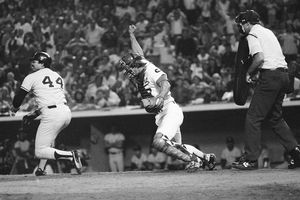 AP
AP
Steve Yeager raises his fist after Bob Welch strikes out Reggie Jackson with two runners on base to end Game 2 of the ’78 Series.Apparently. Clinging to a 4-3 lead in the top of the ninth, the Dodgers sent out Terry Forster for his third inning of work. Yankee playoff hero Bucky Dent opened the inning with a single to left field and moved to second on a groundout. A walk to Paul Blair put the go-ahead run on base, signaling that Forster had passed his expiration date.
Lasorda’s do-or-die replacement had 24 career appearances, 11 in relief. The two batters he needed to get out, Thurman Munson and Jackson, had 465 career home runs – three of them hit by Jackson in the last game of the previous year’s World Series. Dodger fans at the stadium and across the country waited for the roof to cave in.
Welch fed a strike in against Munson, who hit a sinking drive to right field that Reggie Smith caught at his knees.
It was Jackson time. This wasn’t just any slugger. This was the enemy personified, a man, though well-liked in his later years, considered perhaps the most egotistical, vilifiable ballplayer in the game.
Welch began by inducing Jackson to overswing and miss. With Drysdalesque flair, he then sent in a high, tight fastball that sent Jackson spinning into the dirt.
Jackson later told Earl Gustkey of the Times that he was expecting Welch to mix in some of his good offspeed pitches, but instead came three fastballs, each of which were fouled off. Then there was a waste fastball high and outside to even the count at 2-2.
After another foul ball, another high and outside fastball brought a full count. The runners would be moving. Short of another foul, this would be it.
As everyone inhaled, in came the heat. Amped up, Jackson swung for the fences – not the Dodger Stadium fences, but the fences all the way back in New York.
Only after Jackson missed the ball and nearly wrapped the bat around himself like a golf club, only through Jackson’s rage, could Dodger fans begin to comprehend what happened.
Jackson carried his fury into the dugout and clubhouse with him, pushing first a fan on his way to the dugout and then Yankee manager Bob Lemon once inside.
The only thing that could have made the event better for Dodger fans would have been for them to have had longer to enjoy it. The Dodgers didn’t win the World Series that year; they didn’t win another game. Welch himself was the losing pitcher in Game 4, allowing a two-out, 10th-inning run in his third inning of work, and gave up a homer to Jackson in Game 6. But for a moment, the Dodgers and their fans enjoyed one of the most triumphant and exhilarating victories over the Yankees ever imaginable.
If, after revisiting those World Series memories, the thought of Reggie Jackson as a Dodger is still unimaginable, consider the event that took place hours before the Welch-Jackson strikeout. Here’s an excerpt from my chapter on Jim Gilliam, the longtime Dodger who is the only member of the organization to have his number retired without reaching baseball’s Hall of Fame:
On the afternoon of October 11, with Game 2’s first pitch hours away, baseball paused and gathered at Trinity Baptist Church to pay their respects – 2,000 strong – at Gilliam’s funeral. A memorable photo from that day shows Dodger tormentor Reggie Jackson of the Yankees standing solemnly between Lopes and Tommy Lasorda. All three delivered eulogies.
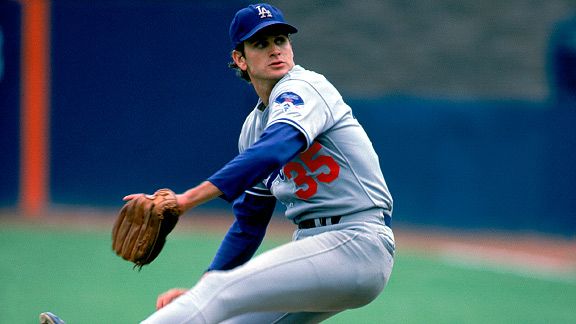
Getty Images
The Dodgers traded 31-year-old Bob Welch (pictured above in 1983) after a 1987 season in which he had a 3.22 ERA and 196 strikeouts in 251 2/3 innings.
Former Dodger general manager Fred Claire was interviewed at length by Albert Lyu of FullCountPitch.com about how the 1988 World Series championship Dodgers were constructed. It’s a good read – including news that the Dodgers had seriously contemplated a Pedro Guerrero-for-Kirk Gibson trade before Gibson became a free agent.
I can’t help wondering what the reaction would have been on Dodger Thoughts to the news that Bob Welch and two relievers had been sent away for Alfredo Griffin, Jay Howell and Jesse Orosco.
- Joe Torre told reporters today Charlie Haeger would start for the Dodgers on Saturday. Carlos Monasterios is in the bullpen for now. When Jeff Weaver is activated, John Ely might be optioned to the minors no matter how well he does in his start Thursday.
- Torre said that Manny Ramirez would be activated from the disabled list Saturday.
- Doug Mientkiewicz signed a minor-league contract with Florida, according to Matt Eddy of Baseball America.
- If you have a 3D TV and subscribe to DirecTV, your first chance to see a live major-league game in 3D at home is now looking like the Yankees at Mariners on July 10, according to Stuart Levine of Variety.
- Ernie Harwell’s passing Tuesday means this is a good time to see, if you haven’t, Elizabeth Merrill’s ESPN.com piece on Harwell saying goodbye.

